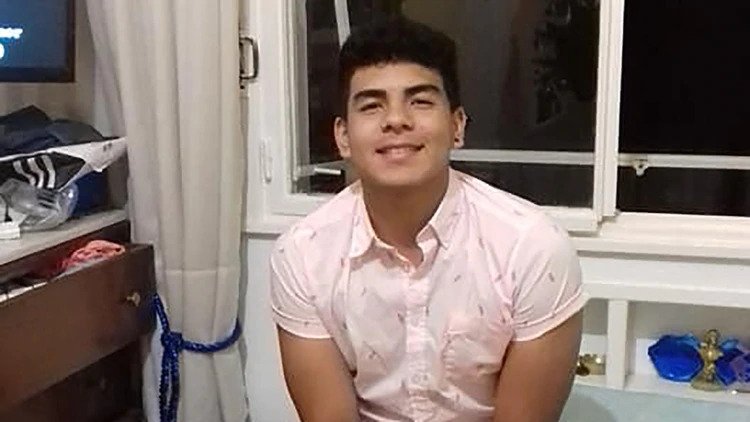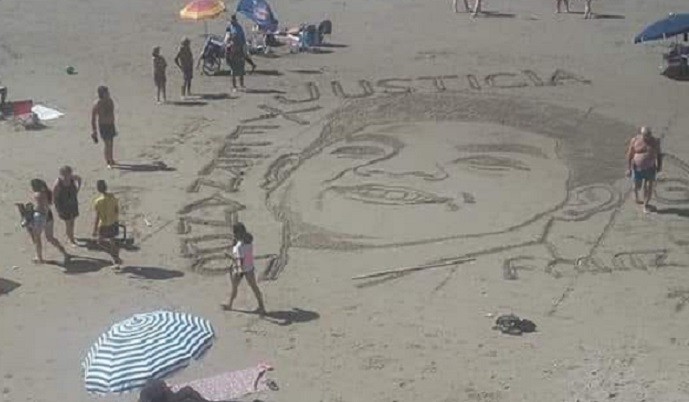RIO DE JANEIRO, BRAZIL – “My house is empty when I get up. I look at his bed, and it’s empty. I know he’ll never come back because of what they did to him. I want justice for my son,” said Graciela Sosa on Tuesday in front of thousands of people demonstrating before the Argentine Congress.
A month ago, her son, Fernando Báez Sosa, 18, was murdered by a group of rugby players in Villa Gesell, a seaside resort on the Argentine coast. He was beaten to death in front of a nightclub and then the criminals left as if nothing had happened, until hours later they were arrested by the police. Eight of them are now charged with aggravated murder.
“Life, life, life” and “Murderers, murderers!” shouted the demonstrators gathered in Buenos Aires to join the murdered teenager’s parents. “Justice for Fernando” was read on A4 sheets they displayed and also on the picture projected behind the stage where Fernando’s parents, his girlfriend and his schoolmates climbed and sat.
A photograph remembered the young man between a Paraguayan flag, where his parents came from, and one of Argentina, where he was born and raised.
“My life is not easy,” Graciela Sosa repeated several times, in a feeble voice and her arms held high. “I want justice. I want them to pay for what they did to him. He was my life, my love, I called him my baby. You don’t know how much I miss him,” she added, before she collapsed into a chair and received a huge ovation from demonstrators.
Argentina has talked of nothing else since January 18th. The economic crisis and the concerns of the IMF’s foreign debt negotiations are barely gaining ground on 24-hour news channels and websites, where Villa Gesell’s crime takes up most of the time and space.
The initial details were that of any fight between two groups crossing paths in a nightclub, shoving and insulting. The bouncers expelled them from the premises and one of the groups wanted to pursue the fight in the street. When one of the boys was left behind, the ten rugby players jumped on him and beat him in the head until they killed him.

The beating took place in the main street of a city that welcomes almost two million tourists every summer and was recorded in dozens of home videos and on the stores’ CCTV cameras. For weeks, Argentinians saw how Fernando Báez Sosa was punched when he had already passed out.
And they saw how the attackers, aged between 18 and 21, wiped the blood off their hands when they passed by the police; how they hugged each other smiling and congratulated each other on the beating; how one of them approached the scene to warn his friends by phone that the young man had “expired”; how minutes later they gathered to eat hamburger a few meters from where they had killed Fernando.
Days later, the messages exchanged by the killers in WhatsApp reached the press, unrepentant, rehearsing alibis, oblivious to the traces they had left everywhere. And later, the details of the 10 youths now in Dolores prison (in the province of Buenos Aires), “good boys” in a special cell with no contact with other prisoners willing to do justice on their own, the food they rejected as “disgusting” and their parents’ visits with filled grocery bags.
Viewers and readers were even more outraged when they learned the story of inmate number 11, accused by the other ten of having been the material perpetrator of the crime when he had not even set foot in Villa Gesell.
Rugby in the crosshairs
The crime has also sparked a national debate around the rugby culture in Argentina, which is associated with the upper classes and, among its younger categories, is known for its violence and fighting. The accounts of players who attack other youths as a group, who are always in smaller numbers, in battles they cannot afford to lose, are recurring.
The victim of this gang would not escape the rule: he was the son of a building janitor and in March he would have started law school. The detainees too: they belong to wealthy families in Zárate, a rich port municipality near the city of Buenos Aires. Many live in gated communities with private security and some are even the children of high officials of the municipal government.

The Clube Náutico Arsenal de Zárate, where some of the detainees were playing, rushed to issue a statement saying that violence is not among the values it promotes, and old sports legends emerged agreeing with the message.
Even rugby teams made up of inmates said that, because of this sport, they found meaning in their lives in prison. Whoever comes out the winner of this cultural battle, the fate of the ten inmates seems sealed. All face reams of evidence that the prosecution was careful to leak to the press drop by drop, and all that remains is to wait for the court to determine the responsibility of each one in the beating.
“One can feel it, One can feel it, Fernando is present”, repeated the crowd on Tuesday outside the Argentine Congress, where they also made an appeal for all victims of violence. “My nephew was also murdered.
I am here for Fernando, but also for him,” said Lorenza, a Paraguayan who traveled by bus from the southern neighborhood of Lugano with dozens of other countrymen. Fernando’s mother “was a maid, her father was a building janitor. They sacrificed their lives for their son and they killed him like a dog. They can’t go unpunished,” the woman said.

